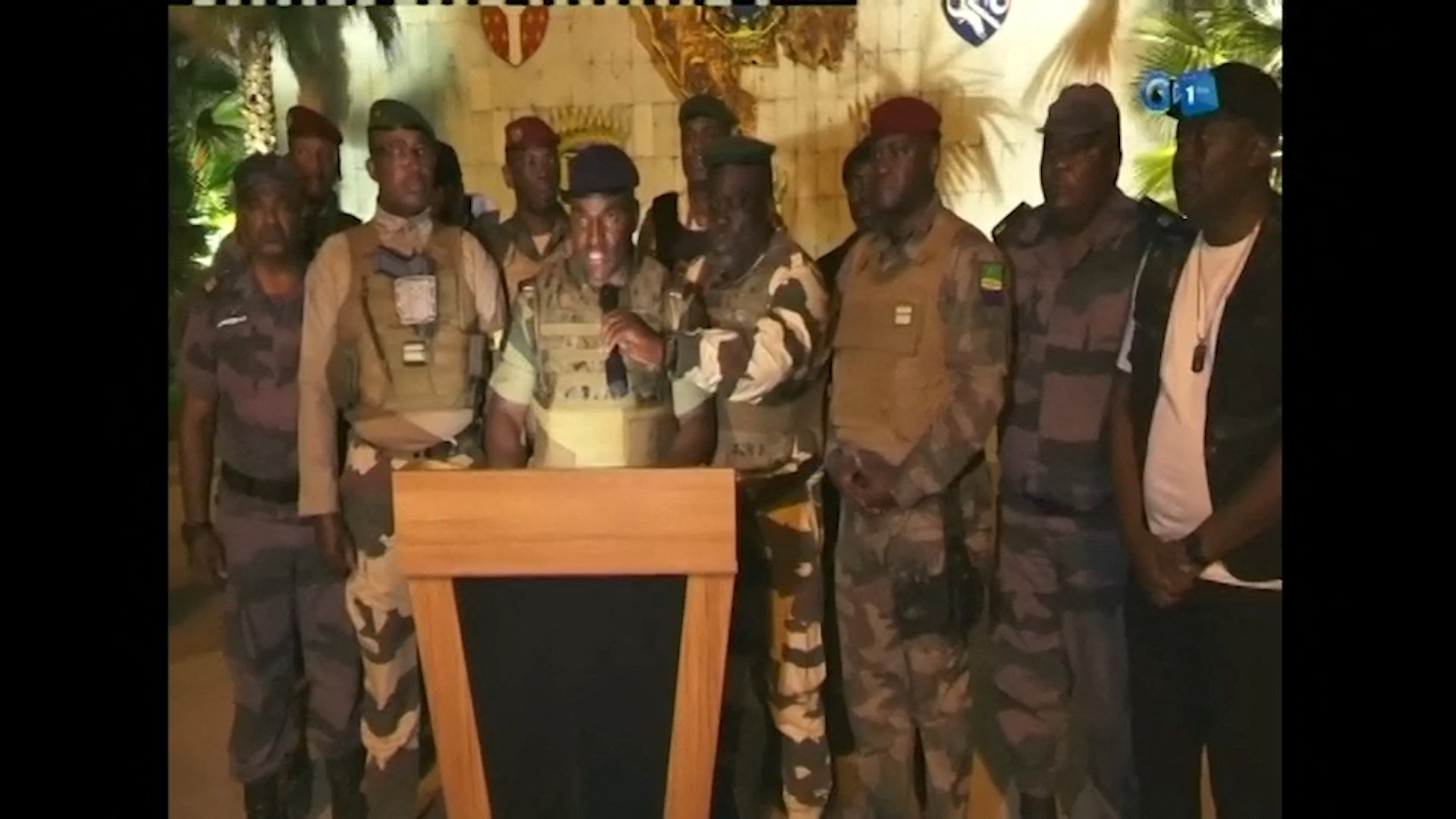
The Gabonese military is seen on television as they announce that they have seized power after the re-election of President Ali Bongo Ondimba, in this photo obtained by Reuters on August 30, 2023. Gabon 1ere/Handout via REUTERS Obtain licensing rights
LIBREVILLE (Reuters) – A group of senior Gabonese army officers appeared on national television in the early hours of Wednesday and said they had seized power minutes after the government’s election commission announced President Ali Bongo had won a third term.
The officers, who appeared on Gabon 24 TV, said they represent all security and defense forces in the central African country. They said that the election results were annulled, all borders were closed until further notice, and state institutions were dissolved.
A Reuters reporter said loud gunfire could be heard in the capital, Libreville, after it appeared on television.
There was no immediate comment from the government of the OPEC member. There were no immediate reports on the whereabouts of Bongo, who was last seen in public when he cast his vote in the elections on Saturday.
“In the name of the Gabonese people…we have decided to defend peace by bringing an end to the current regime,” the officers said in a statement.
While one of the officers was reading the joint statement, about a dozen others, wearing uniforms and berets, stood silently behind him.
The military introduced themselves as members of the Transition and Institutional Restoration Committee. The state institutions they announced were dissolving included the government, the Senate, the National Assembly, the Constitutional Court, and the Electoral Commission.
If the coup succeeds, it will be the eighth in West and Central Africa since 2020. Coups in Mali, Guinea, Burkina Faso, Chad and Niger have undermined democratic progress in recent years.
And last month, the military seized power in Niger, sending shock waves across the Sahel and drawing in world powers whose strategic interests were at stake.
Tensions have been running high in Gabon amid fears of turmoil after Saturday’s presidential, parliamentary and legislative elections, which saw Bongo seek to extend his family’s 56-year grip on power while the opposition pressed for change in the oil- and cocoa-rich but impoverished nation. afflicted nation.
The lack of international observers, the suspension of some foreign broadcasts, and the authorities’ decision to cut internet service and impose a night-time curfew across the country after the elections raised concerns about the transparency of the electoral process.
Gabon thwarted a military coup attempt in January 2019 after soldiers briefly seized the state radio station and broadcast a message saying that Bongo, who had suffered a stroke months earlier, was no longer fit for office.
Things returned to normal hours later after two suspected coup plotters were killed and others arrested.
In power since 2009
The Gabonese Elections Center said earlier on Wednesday that Bongo won the election with 64.27% of the vote, and that his main rival Albert Ondo Ossa came in second with 30.77%.
Bongo, 64, who succeeded his father Omar as president in 2009, ran against 18 challengers, six of whom supported Ondo Ossa in a bid to narrow the race.
The government said internet blackouts and curfews were necessary to prevent the spread of false news and to protect public safety. Bongo’s controversial election victory in 2016 sparked violent protests that led to the parliament building being set on fire.
His team rejected allegations of fraud by Ondo Ossa and the opposition coalition after a vote marred by the opening of many polling stations several hours late.
Alternance 2023 has also reported other alleged irregularities, including failure to properly post ballots for its candidates in some areas. Reuters was unable to independently verify this claim.
The European Union was not invited to observe these elections. EU observers have previously questioned Bongo’s narrow victory in the 2016 presidential election.
On Monday, media watchdog Reporters Without Borders (RSF) expressed concern about the internet blockage and temporary suspension in Gabon of broadcasts by French Media International (RFI), France 24 and TV5 Monde.
“Reporters Without Borders condemns the series of attacks on press freedom and pluralism of information, facts that are likely to affect the transparency of the general elections,” she said in an online post.
Both of Bongo’s previous electoral victories were questioned by the opposition, citing fraud. He first came to power in the 2009 elections after the death of his father, Omar Bongo, before being re-elected in 2016.
(Reporting by Jerrods, Wilfred Upangom and Alessandra Prentice; Prepared by Mohamed for the Arabic Bulletin; Prepared by Mohamed for the Arabic Bulletin) Writing by Raju Gopalakrishnan. Editing by Simon Cameron Moore
Our standards: Thomson Reuters Principles of Trust.

“Subtly charming student. Pop culture junkie. Creator. Amateur music specialist. Beer fanatic.”
